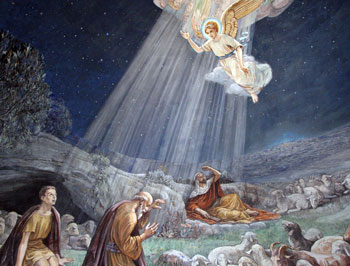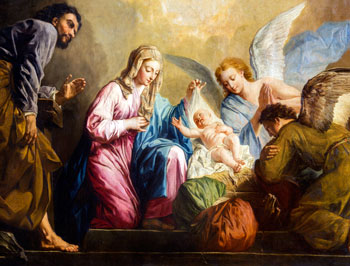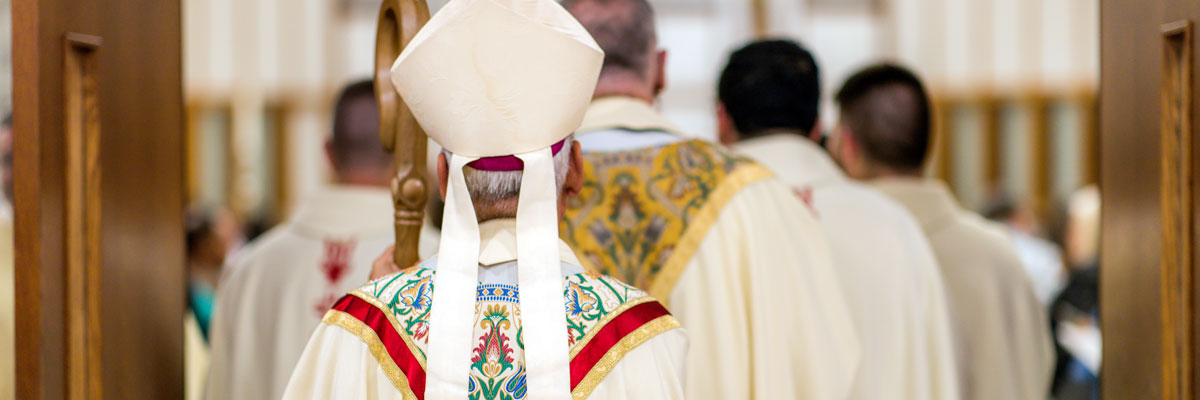Official Website of the
Catholic Diocese of Little Rock
Become a messenger of the Good News
Published: December 20, 2016
Click on the button above to see Christmas Mass times for parishes across Arkansas. If your parish is not listed, please contact your parish directly for Mass times. Every effort has been made to ensure accuracy. Please confirm the schedule with the parish you wish to attend. This list includes information about Masses for children and those offered in languages other than English.
The Christmas season runs from Dec. 25, Christmas Day, to Jan. 9, the feast of the Baptism of the Lord. The word "Christmas" comes from the Middle English "Christemasse," which literally means Christ's Mass. To learn more, see the Catechism of the Catholic Church, nos. 524-528 or visit the Christmas resources of the U.S. Conference of Catholic Bishops. These include a family Christmas calendar, recommended Christmas movies, blessings for the nativity scene, Christmas tree, the home on Epiphany and guide for lectio divina during the Christmas season.
"'Do not be afraid; for behold, I proclaim to you good news of great joy that will be for all the people. For today in the city of David a savior has been born for you who is Messiah and Lord. And this will be a sign for you: You will find an infant wrapped in swaddling clothes and lying in a manger.' And suddenly there was a multitude of the heavenly host with the angel, praising God and saying: 'Glory to God in the highest and on earth peace to those on whom his favor rests.'" (Luke 2:10-14)
 The angel of the Lord gave this message to shepherds keeping the night watch over their flock. It seems fitting that those whose job it was to keep watch received this news. During the season of Advent, we have anticipated the coming of the Lord, first through his birth and ultimately his coming again in glory at the end of time.
The angel of the Lord gave this message to shepherds keeping the night watch over their flock. It seems fitting that those whose job it was to keep watch received this news. During the season of Advent, we have anticipated the coming of the Lord, first through his birth and ultimately his coming again in glory at the end of time.
On the first Sunday of Advent, we were warned about the importance of keeping watch. "Be sure of this: if the master of the house had known the hour of night when the thief was coming, he would have stayed awake and not let his house be broken into. So too, you also must be prepared, for at an hour you do not expect, the Son of Man will come.” (Matthew 24:43-44)
The coming of the Messiah had long been prophesied. A savior "to bring glad tidings to the poor ... to proclaim liberty to captives and recovery of sight to the blind; to let the oppressed go free." (Luke 4:18-19) The Jewish people had waited a very long time for God to fulfill his promise. When he did, it was not just for his chosen, but for all people. That truly is good news of great joy!
How the Messiah came reveals not only God's faithfulness but also his great love for us. On Christmas we celebrate that he became one of us. It is the feast of the incarnation, the feast of God becoming flesh. (The Latin "in carne" means "enfleshment.")
On the fourth Sunday of Advent, Bishop Anthony B. Taylor explained the significance of the incarnation. "Our first reading proclaims God's promise that 'the virgin shall conceive, and bear a son, and shall call him Emmanuel' — which, of course, means 'God is with us.' And then, in our Gospel the angel of the Lord appears to Joseph in a dream to describe how this will come about: It was by the Holy Spirit that Mary, though a virgin, was able to conceive, and moreover, he was to call him 'Jesus' — a name which means 'God saves.'
 "In other words, God is with us to save us. 'God is with us' points to Jesus' identity as the Second Person of the Blessed Trinity, while 'God saves' points to the reason for Jesus' birth: God will save us through him. ... God's presence among us began with the virgin birth on Christmas and our redemption was accomplished in Jesus on Good Friday and Easter Sunday." (Read his homily.)
"In other words, God is with us to save us. 'God is with us' points to Jesus' identity as the Second Person of the Blessed Trinity, while 'God saves' points to the reason for Jesus' birth: God will save us through him. ... God's presence among us began with the virgin birth on Christmas and our redemption was accomplished in Jesus on Good Friday and Easter Sunday." (Read his homily.)
More than just a day celebrated once a year, we are to live the incarnation in our everyday lives and keep watch as we anticipate Jesus' return.
The website for the U.S. bishops explains that Christmas is second only to Easter in its importance in the liturgical year. Belief in the incarnation is a uniquely Christian teaching. "Because of this belief, God is not only transcendent, but also wholly immanent, Emmanuel (God-with-us). While remaining transcendent (meaning we must rise above our present condition to reach him), (God) is at the same time immanent (meaning he is with us as we rise toward him). Every Eucharist is like Christmas where the bread and wine are transformed into his Flesh, his Body and Blood, and, in a sense, he is born anew on the altar."
In his homily, Bishop Taylor explained that, "our appropriation of this great work of salvation continues to unfold in a world in which the power of darkness and every kind of evil still continue to blind us. Many people stumble through life lost and forsaken, living for nothing bigger than themselves. ... And it is into that world that Jesus sends us to bring light and hope and courageous resistance to evil."
The Lord sent his only Son in "kindness and generous love ... not because of any righteous deeds we have done but because of his mercy, he saved us through the bath of rebirth and renewal by the Holy Spirit, whom he richly poured out on us ... so that we might ... become heirs in hope of eternal life." (Titus 3:4-7)









